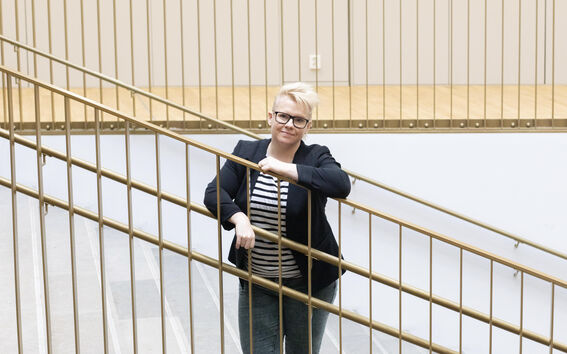Can technology save us in the sustainability transition? Five things everyone should understand about techno-optimism

Hope for a better future increasingly relies on technology: electric cars, artificial intelligence or green energy, for example. This approach is convenient for both consumers and politicians, but at the same time highly problematic.
Academy Research Fellow and Doctor of Social Sciences Johanna Ahola-Launonen from the Department of Management Studies at Aalto University School of Business leads the SUSTHOPE research project, which examines technological optimism and its consequences.
-
There is no green growth, nor will there be in the future
Technological solutions are not sufficient to solve ecological and societal crises without changing our consumption habits. Research shows that emissions in many countries have decreased, but far too slowly. Genuine green growth has not been achieved, nor will it be achieved with current developments. Two years ago, researchers stated that for the 1.5°C target and economic growth to be achieved simultaneously, emission reductions would need to accelerate tenfold immediately.
In Finland, emissions have decreased, but the overall impact of consumption has not decreased at the same pace. Emissions from energy production and industry have decreased, but a large portion of Finns’ consumption – such as food, clothing and electronics – is produced abroad. Imports thus increase Finland’s consumption carbon footprint, as an estimated half of Finland’s consumption emissions occur outside its borders. In Finland, per capita natural resource consumption is among the highest in Europe.
-
At worst, hope can become a passive use of power
Hope is a condition for all future visions, but it is also a double-edged sword. Hope can unite and carry us forward as a group, mobilising us. However, not all hope is good hope. Hope can also be passive and lead to responsibility avoidance. It can lock thinking and obscure power relationships.
Expectations and hopes are thus power use. What we expect starts to guide planning, investments and policies. If a group in a position of power expects and hopes that the sustainability transition will be primarily resolved through technology, some other options are excluded. For example, in climate policy, hope often focuses on new technologies – such as the hydrogen economy and electric cars – while there is less talk about reducing consumption. Thus, technological optimism narrows the political imagination of what kinds of solutions are considered possible. -
Hidden costs fuel faith in technology as salvation
Technology appears to be an easy and clean solution when harms are outsourced elsewhere. Battery production increasingly requires minerals and mines that cause significant environmental and societal consequences in the global south – while AI and cloud services’ data centres consume vast amounts of electricity and water far from end users. Emissions and mining often occur far from sight and product consumption. Thus, technology is easy to see as immaterial and abstract: electricity comes from a pole and a solar panel from a mail package, digitalisation floats in the cloud.
-
The hype cycle feeds techno-optimism
Many of our accustomed ways of speaking feed belief in technology. New technologies are launched with great promises. When they are not fulfilled, we move on to the next without processing disappointment. The hype cycle of promises and disappointments maintains the belief that the solution is just around the corner.
On the other hand, public discourse about sustainability goals maintains the perception that growth, economy and well-being can be achieved simultaneously, and conflicts need not be faced. This suits decision-makers well, who can promise change without giving up. Research and innovation policies, in turn, support the techno-optimistic illusion, as funding and attention are more easily gained for new and exciting devices than for some ‘boring consumption advocacy solutions’.
Historically, reasons can also be found in the worldview of the oil age. Easy and cheap fossil resources enabled industrialisation, a consumption-centric lifestyle and continuous economic growth for decades. This has created a perception that technology can solve all our problems. -
Technology must be understood more broadly
Technology is not just devices or inventions. It is also materials and raw materials, social networks, practices, ways of living. It is also a means of production and a powerful form of governance. In other words, there is no non-technological future; technology is, in some way, part of all imaginable futures.
Thus, hope must also be directed towards technology. However, it is good to consider what role it is given as part of the solutions. Do we hope and expect it to solve our problems on its own – and if not entirely, how comprehensive a solution do we consider it to be? Under what conditions is technology developed and for whose needs?
Towards Sustainable Hope: Exploring the Harmful and Beneficial Effects of Techno-Optimism (SUSTHOPE) is a research project that examines the role of technological optimism in sustainability transitions. Hope towards technology can at best serve as a motivating and guiding resource, but it can also take the form of uncritical optimism that maintains existing consumption structures and does not promote the necessary societal change.
The SUSTHOPE project is funded by the Academy of Finland (2025–2028), the Finnish Cultural Foundation (2024, 2028–2029) and the Jenny and Antti Wihuri Foundation (2024).
https://www.aalto.fi/en/department-of-management-studies/susthope-research-project
Further information

Department of Management Studies
The Department of Management Studies offers a dynamic environment for scholarship and learning.

Read more news

Apply Now: Unite! Visiting Professorships at TU Graz
TU Graz, Austria, invites experienced postdoctoral researchers to apply for two fully funded visiting professorships. The deadline for expressions of interest is 20 February 2026, and the positions will begin on 1 October 2026.
Hanaholmen’s 50th anniversary exhibition lives on online – making the history of Finnish–Swedish cooperation accessible worldwide
MeMo Institute at Aalto University has produced a virtual 3D version of the anniversary exhibition of Hanaholmen.Soil Laboratory Exhibition – Exploring the Dialogue Between Human and the Earth in Utsjoki
Soil Laboratory explores the relationship between humans and the earth as a living landscape through ceramic practices in Utsjoki.






